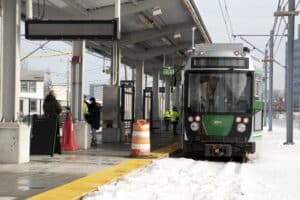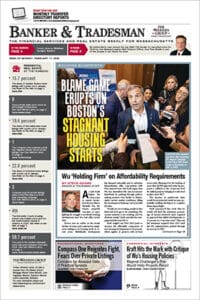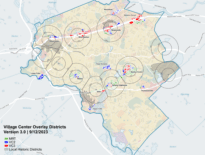
An MBTA Green Line train idles during a test run Feb. 3, 2022 at the platform at Union Square station in Somerville. Photo by Chris Lisinski | State House News Service / File
MBTA officials shed little new light Thursday on the “unusual” rail problems that have slowed the nearly brand-new Green Line Extension almost to a halt, while a growing tide of public frustration is taking aim at Gov. Maura Healey and her hand-picked deputies.
Portions of the Green Line Extension’s Medford and Union Square branches cannot safely operate above 3 mph because the tracks now appear slightly too narrow for normal operations, General Manager Phil Eng told agency overseers at a public meeting.
Those conditions only appeared on a recent inspection, not prior scans, Eng said, adding that crews are still trying to determine how long the issue has been present.
“You would typically expect the gauge to widen, and that can be, over time, wear on the rail, wear on the ties and just the use of the track,” Eng said at an MBTA Board of Directors meeting. “What I understand is the tolerances that resulted in these recent speed restrictions is very minor. We need to investigate what took place between the previous [inspections] that did not indicate any narrow gauge to the recent ones that resulted in these speed restrictions.”
“It is not typical” for tracks to become more narrow, “but I would not say it’s impossible,” he added.
Problem’s Origin a Mystery
More than half a dozen segments of track along the Green Line Extension – whose one-stop Union Square branch opened in March 2022 followed by a larger route to Medford in December 2022 – are subject to 3 mph speed limits, according to MBTA data. Altogether, the restrictions apply to about a mile of rail.
Numerous earlier scans of the tracks did not identify any problems with the width of the Green Line Extension rails, Eng said. He added that officials need to investigate “what took place between the previous runs that did not indicate any narrow gauge to the recent ones that resulted in the speed restrictions.”
An official with the Department of Public Utilities, which serves as the state-level agency responsible for MBTA safety oversight, said the MBTA, FTA, DPU and consultants all certified the Green Line Extension was compliant with safety standards before it began operations.
“The DPU is currently investigating the narrow gauge defects and associated geometry reports that prompted the speed restrictions on the Green Line Extension,” Maria Hardiman, a spokesperson for the Executive office of Energy and Environmental Affairs, said in a statement.
The sudden emergence of speed restrictions on some of the newest tracks in the T’s system is the latest addition to a steady torrent of failures, disruptions and breakdowns both before and after the Federal Transit Administration last year identified major safety problems at the MBTA.
“I ride that Green Line Extension every day as well. I talk to the riders, I fully understand that frustration,” Eng said. “These types of occurrences are unacceptable, and that’s why we’re working very hard in terms of capital delivery, and working through these issues earlier. What we are doing now, though, is we’re going to make sure that we address those recent speed restrictions promptly, timely, and focus on safety and restoring that service reliability that the riders need.”
Healey’s Transit Honeymoon Over?
Healey, who took office in January, has reshaped the agency’s leadership by tapping Eng, creating a new Department of Transportation chief safety officer, and replacing about half of the seats she controls on the T’s board.
The public comment period at Thursday’s board meeting suggested, however, that some passengers and advocates think the first-term governor’s grace period is coming to an end.
“Riders in the broader public see an agency that is, in so many ways, dramatically worse than the beginning of this year, from abysmal headways that the agency is still not able to adhere to, to slow zones that have spread through the system like a pandemic and a near-constant barrage of bad news related to the FTA, and of course, yesterday’s news of the unacceptable conditions of the newest multibillion-dollar piece of infrastructure,” TransitMatters Executive Director Jarred Johnson told the board. “The confidence in this agency is at an all-time low.”
Johnson stressed that he sees some progress, like the hiring of Eng as an experienced general manager, and that the picture “is not all bad.” But those upsides “mean nothing to riders” struggling with dropped bus trips or extensive delays, he said, warning that the public views the MBTA as “on the verge of a death spiral.”
“The agency is very quickly becoming a punchline, and we need the agency to not become a punching bag,” Johnson said. “We need the agency to stand up for itself and ask for what it needs. We need to show that this agency and its riders are as much of a priority as tax cuts.”
Fears of a ‘Death Spiral’
One rider who addressed the board for more than seven minutes said he had been willing to give Eng the “benefit of the doubt” during the new GM’s first few months, but is no longer willing to do so.
“This system is in crisis. It’s inflicting a death spiral of transit and traffic on this city, and yet it’s largely been business as usual from the board,” the rider, whose first name is Steve, said during the meeting. “When the Legislature and then your own riders here asked how much it would cost to fix the system to a state of good repair, you stonewalled them. We’ve asked you to help us understand how our sacrifice last year during the Orange Line shutdown only resulted in even worse track conditions, but no one will answer us.”
Riders were on the mind of one of the board’s newest members, Mary Skelton Roberts, whom Boston Mayor Michelle Wu appointed Monday to the panel.
“There’s no question you have to do the repairs and that you have to have a safety protocol in place, and yet, the safety issues continue to trump basic level of service,” Skelton Roberts said. “So you have ridership and folks get frustrated, and they don’t always understand what’s going on and they leave the system. Once they leave the system, it’s hard to get them back on.”
Caitlin Allen-Connelly, a senior transportation adviser for the business group A Better City, warned the board that “business as usual is no longer an option.” She praised Eng for his moves last week to reorganize the MBTA’s leadership hierarchy, and called for “drastic measures” to fix slow zones and address safety problems.
“Getting the system back on track will require massive systems and cultural change, and we also know that that doesn’t happen overnight. At the same time, the authority is severely impaired and service is suffering,” Allen-Connelly said. “I think we heard from riders, we heard from the new board member, that riders are struggling to get to work, appointments, schools, daily activities and oftentimes, the impact isn’t equitable. It’s touching people who really don’t have another option.”






